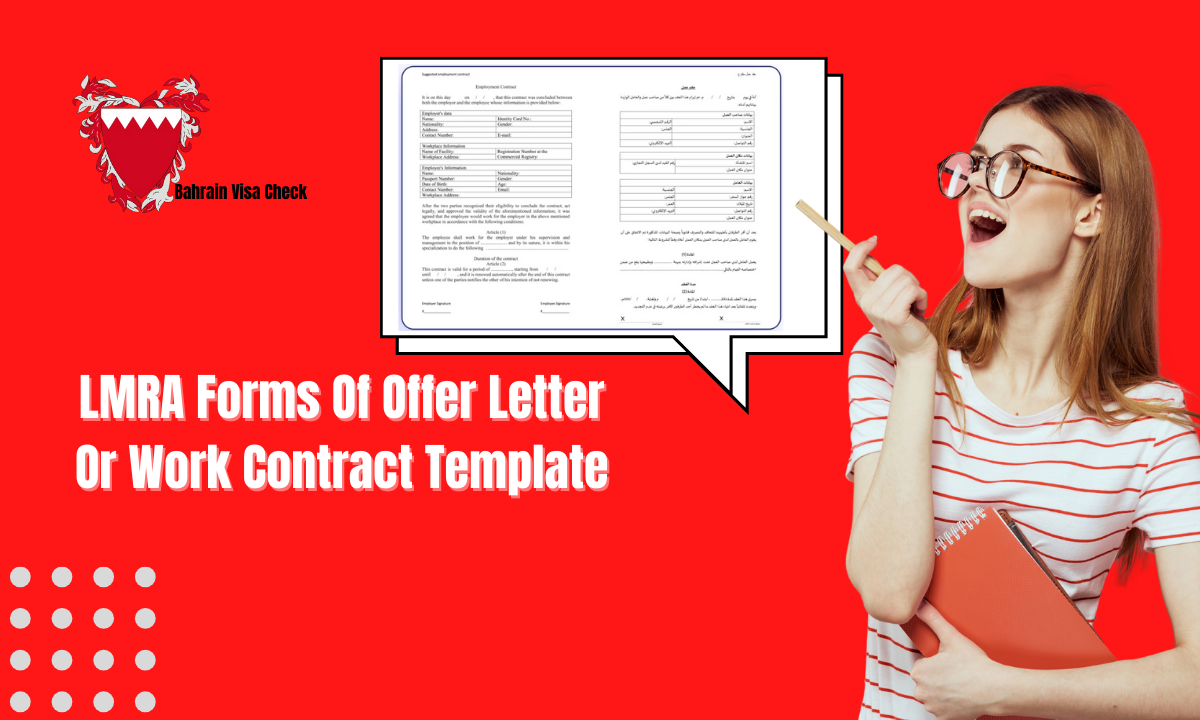LMRA Forms Of Offer Letter Or Work Contract Template. In the modern workforce, employment contracts play a vital role in defining the relationship between employers and employees. The Labour Market Regulatory Authority (LMRA) is responsible for regulating labor relations in Bahrain, ensuring compliance with employment laws, and maintaining fair work conditions. One of the essential documents within this framework is the Offer Letter or Work Contract Template. This article provides an in-depth look at the LMRA forms, their significance, key elements, and compliance requirements.
LMRA Forms of Offer Letter and Work Contract
An Offer Letter is a preliminary document issued to a prospective employee before formalizing their employment. It outlines essential job details, compensation, and employment terms. Once accepted, a Work Contract follows, providing a legally binding agreement between the employer and employee.
Importance of LMRA Offer Letters and Work Contracts
- Legal Protection: Clearly defines the rights and obligations of both parties.
- Transparency: Ensures clarity in terms of salary, benefits, and job responsibilities.
- Regulatory Compliance: Aligns with Bahrain’s labor laws to prevent disputes.
- Employment Security: Establishes job stability for employees.
Read also: Is There An Online Visit Visa For Bahrain?
Components of LMRA Offer Letter
A well-structured offer letter should include the following elements:
| Section | Description |
|---|---|
| Employer Details | Name, Address, and Contact Information |
| Employee Details | Full Name, Address, and Nationality |
| Job Title & Description | Role, Responsibilities, and Department |
| Salary & Benefits | Basic Salary, Allowances, Bonuses, and Benefits |
| Working Hours & Leave Policy | Standard Work Hours, Overtime, and Vacation Policy |
| Contract Type | Fixed-term or Indefinite |
| Probation Period | Duration and Conditions for Confirmation |
| Termination Clause | Notice Period and Conditions for Termination |
| Signatures | Signatures of Both Parties |
LMRA Forms of Offer Letter and Work Contract In PDF
Read also: Bahrain Work Visa – Bahrain Work Visa Check
LMRA Work Contract Templates
Once an employee accepts the offer letter, a Work Contract is prepared, which serves as the official employment agreement. The LMRA provides standardized templates to ensure uniformity and legal compliance.
Types of LMRA Work Contracts
- Fixed-Term Contract: A contract valid for a specific duration.
- Indefinite-Term Contract: A contract with no predetermined end date.
- Part-Time Contract: For employees working fewer hours than full-time employment.
Mandatory Clauses in LMRA Work Contracts
- Job Details: Specifies title, department, and reporting authority.
- Salary & Compensation: Breaks down wages, allowances, and deductions.
- Leave Entitlements: Details annual leave, sick leave, and special leave policies.
- Termination Policy: Specifies notice periods, grounds for termination, and severance benefits.
- Code of Conduct: Includes workplace rules and disciplinary actions.
How to Draft an LMRA-Compliant Offer Letter or Work Contract
To ensure compliance with LMRA regulations, companies must adhere to best practices when drafting these documents. Below is a step-by-step guide:
Step 1: Define Employment Terms
Clearly outline the job role, responsibilities, and expected performance standards.
Step 2: Specify Compensation and Benefits
Provide a detailed breakdown of salary, allowances, and any additional perks.
Step 3: Address Working Conditions
Mention work hours, overtime policies, and leave entitlements.
Step 4: Include Legal Clauses
Ensure the contract complies with Bahrain labor laws, covering termination policies and dispute resolution mechanisms.
Step 5: Secure Signatures
Both employer and employee must sign the document to validate the agreement.
Common Mistakes to Avoid in LMRA Offer Letters & Work Contracts
Employers often make errors that lead to legal disputes. Here are some pitfalls to avoid:
- Vague Job Descriptions: Lack of clarity on responsibilities may create confusion.
- Ambiguous Salary Structure: Ensure all components are explicitly mentioned.
- Ignoring Probationary Clauses: Clearly define the conditions for confirmation.
- Missing Termination Terms: Outline notice periods and severance policies.
- Non-Compliance with LMRA Rules: Always cross-check with LMRA guidelines.
LMRA Offer Letter vs. Work Contract
| Feature | LMRA Offer Letter | LMRA Work Contract |
|---|---|---|
| Purpose | Initial agreement before employment | Legally binding employment contract |
| Details Included | Basic salary, job role, joining date | Full employment terms, including leave policies and termination clauses |
| Legal Binding | Not legally binding until signed by both parties | Legally binding upon signing |
| Modifications | Can be modified before signing | Requires mutual consent for modification |
Best Practices for Drafting an LMRA-Compliant Work Contract
To ensure compliance with LMRA regulations, follow these best practices:
- Use Clear Language – Avoid ambiguous terms.
- Include All Mandatory Clauses – Ensure it aligns with Bahrain’s labor laws.
- Get Employee Acknowledgment – Ensure the employee understands all terms before signing.
- Regular Updates – Keep contracts updated to reflect legal changes.
- Consult Legal Experts – Seek professional advice when drafting complex clauses.
FAQs About LMRA Forms Of Offer Letter Or Work Contract Template
What is the difference between an LMRA Offer Letter and a Work Contract?
Ans: An Offer Letter is a preliminary document, whereas a Work Contract is a legally binding agreement that finalizes employment terms.
Are LMRA contracts mandatory in Bahrain?
Ans: Yes, all employers in Bahrain must issue LMRA-compliant contracts to ensure legal employment.
Can an employer change the contract terms after signing?
Ans: Any amendments require mutual agreement and must be documented in writing.
Conclusion
A comprehensive LMRA Offer Letter or Work Contract is crucial for ensuring a smooth employer-employee relationship in Bahrain. It provides transparency, legal protection, and labor regulations compliance. Employers should carefully structure these documents to reflect fair employment practices and avoid potential disputes.

